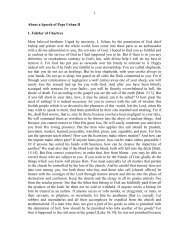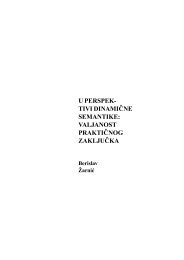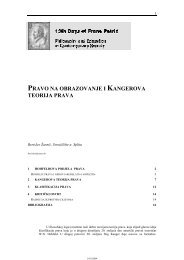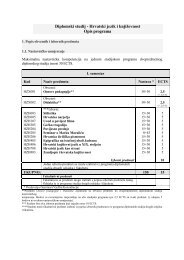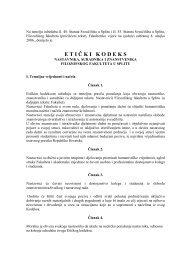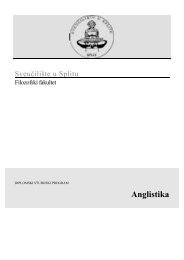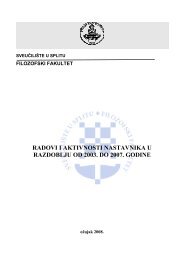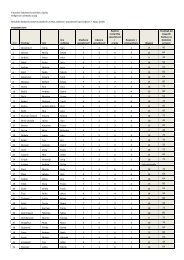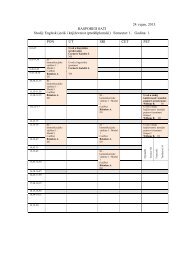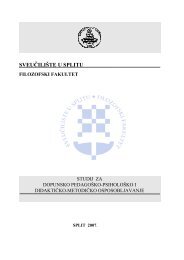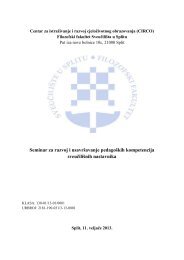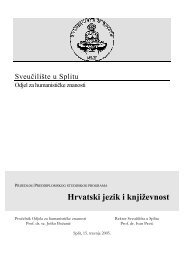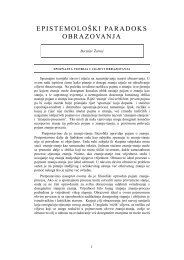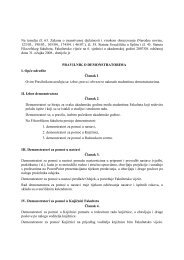English Studies
English Studies
English Studies
You also want an ePaper? Increase the reach of your titles
YUMPU automatically turns print PDFs into web optimized ePapers that Google loves.
G R A D U A T E D E G R E E P R O G R A M M E : E N G L I S H S T U D I E S<br />
assurance<br />
methods<br />
developed by students. Students analyse data obtained by questionnaires<br />
and present the results.<br />
The teacher monitors the quality by checking students’ exam results.<br />
Evaluation by the Agency for monitoring the excellence of teaching.<br />
Course title Didactics<br />
Course code HZX002<br />
Type of course Lecture + Seminar / / Advisory hours<br />
Level of course Basic level course<br />
Year of study First Semester One<br />
ECTS<br />
(Number of<br />
credits allocated)<br />
Name of<br />
lecturer<br />
Learning<br />
outcomes and<br />
competences<br />
5 ECTS<br />
Contact hours (30 lectures + 30 seminars/advisory hours) = 1.5 ECTS<br />
Student study time (105 hours) = 3.5 ECTS<br />
Prof. Dr Stjepan Rodek,<br />
Morana Koludrović, assistant<br />
After the completion of the course, the student is expected to understand the<br />
major aspects of modern didactic theory of education and teaching.<br />
S/he is also expected to have developed the ability to apply the gained<br />
knowledge to the solution of various practical problems related to education<br />
and teaching (planning, organizing, evaluating).<br />
S/he should be able to show the ability to demonstrate knowledge of<br />
modern teaching methods and strategies as well as the ability of critical<br />
understanding of recent teaching practice.<br />
The student works towards the ability to organize teaching that promotes the<br />
use of strategies for active learning.<br />
Prerequisites Enrolment in the first year of gradute study (teacher education).<br />
Course contents Didactics – theory of education and teaching. Basic concepts of didactics.<br />
Modern didactic theories: “Berlin didactics” (P. Heimann), Criticalconstructive<br />
didactics (W. Klafki), Curricular didactics(Ch.Moeller),<br />
Cybernetical didactics (F. von Cube), Critical-communicative didactics (R.<br />
Winkel)<br />
Methodological problems of didactic research.<br />
Syllabus.Theoretical-methodological approaches to syllabus design and<br />
curriculum development. Realisation and adapted programmes. Evaluation<br />
of teaching programme.<br />
Structure and stages of teaching process. Teaching systems. Teaching<br />
methods.<br />
Organization and articulation of teaching.<br />
Media in teaching: didactic function, choice and classification of teaching<br />
media. Computers in teaching: simulations in teaching; the Internet in<br />
teaching. Didactic shaping of programmes.<br />
Didactic solutions in some alternative schools (Montessori, Jenaplan,,<br />
Waldorf).<br />
Lifelong learning. Preparing students for lifelong learning.<br />
Recommended 1. Bognar, L. & Matijević, M. (2002). Didaktika. Zagreb: Školska<br />
67



